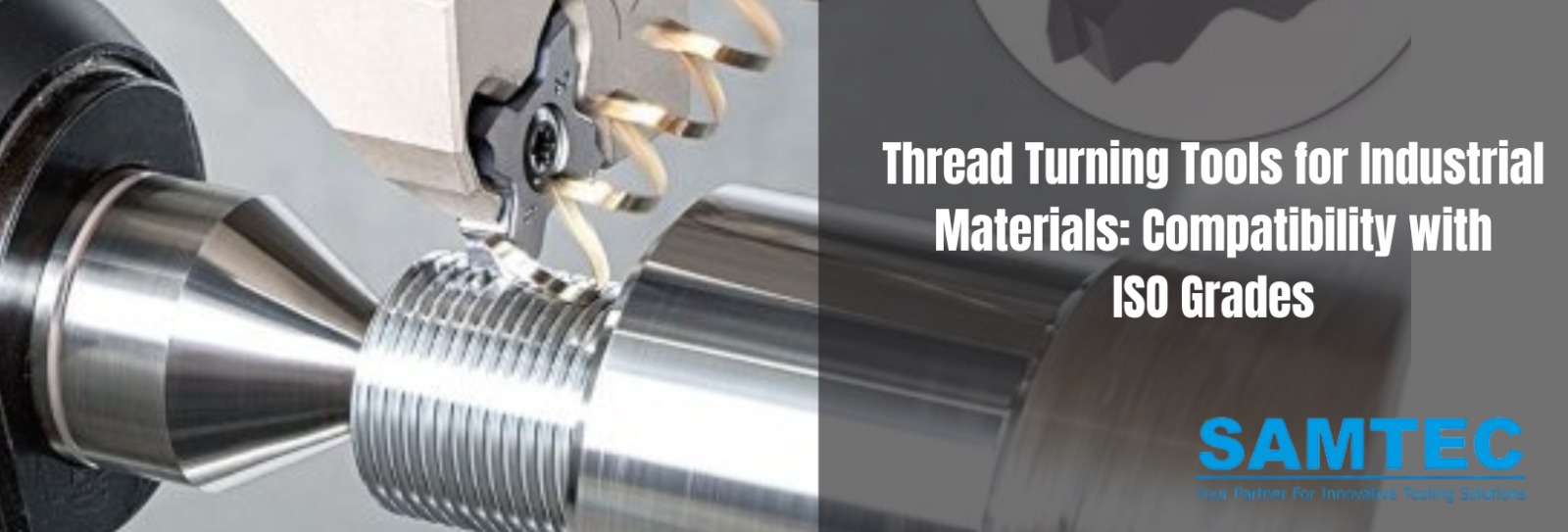Thread turning is an essential machining process used to produce precise threads in various materials. The selection of threading tools is critical, and one of the most important factors is the compatibility of the tool with the material, determined by ISO grading. The ISO grading system classifies materials based on hardness, machinability, and composition, helping manufacturers choose the right tools for different applications. This blog explores how ISO grades influence tool selection and highlights SAMTEC’s range of thread-turning tools.
Understanding ISO Grades and Their Role
ISO grades categorize materials into different groups based on their properties, influencing the choice of threading tools:
- ISO P (Steel): Includes carbon steels and stainless steels. Tools need to handle wear and thermal stress.
- ISO M (Stainless Steel): Requires tools with high chip resistance and wear resistance.
- ISO K (Cast Iron): Softer materials that generate heat during machining.
- ISO N (Non-Ferrous Metals): Includes materials like aluminum, requiring tools that prevent built-up edge (BUE).
- ISO S (Super Alloys): Tough, high-temperature-resistant materials that need durable tools.
- ISO H (Hard Materials): Includes hardened steels that demand tools with high hardness and wear resistance.
Selecting the Right Thread Turning Tool
Choosing the right tool involves considering tool material, coatings, and geometry:
- Tool Material: Carbide tools are ideal for harder materials like superalloys (ISO S) and hard materials (ISO H), while high-speed steel (HSS) works well for softer materials like cast iron (ISO K).
- Coatings: PVD TiAlN coatings enhance tool wear resistance and are effective for tough materials like stainless steel (ISO M) and superalloys (ISO S).
- Tool Geometry: Sharper tools with higher rake angles work best for softer materials, while tougher materials need tools with stronger geometries to resist wear and chipping.
SAMTEC Thread Turning Tools
SAMTEC offers a wide range of thread-turning tools designed to handle various ISO grades efficiently:
- SC7819 Grade Inserts: These inserts feature PVD TiAlN coatings for excellent wear resistance and are suitable for ISO P, M, K, and S materials. They offer reliable performance for both external and internal threading. The SC7819 grade provides superb chipping resistance and is ideal for achieving high-quality threads with less wear.
- Miniature Inserts: Perfect for smaller diameter threading (as small as 6.4mm), these inserts are ideal for non-ferrous materials like aluminum (ISO N). They provide precision cutting for intricate threading applications, ensuring a smooth finish.
- Multitooth and U-Type Inserts: These inserts are designed for deeper cuts and high chip removal rates, making them perfect for tougher materials like superalloys (ISO S). Their design ensures consistent thread quality, especially when dealing with high volumes of workpieces.
SAMTEC’s threading tools are engineered for durability and high performance, providing solutions for both external and internal threading. Whether you're machining hard metals or non-ferrous materials, their tools ensure optimal results and long-lasting performance, reducing tool wear and improving operational efficiency.
Summary:
Understanding the compatibility between thread turning tools and ISO grades is crucial for achieving high-quality threads and improving machining efficiency. SAMTEC’s tools, such as SC7819 grade inserts, miniature inserts, and multitooth inserts, offer excellent performance across various materials, from steel to superalloys. By choosing the right tool for the specific ISO grade, manufacturers can ensure longer tool life, reduced wear, and improved thread quality. SAMTEC’s comprehensive range of tools provides manufacturers with the flexibility to tackle a variety of threading applications with precision and reliability, contributing to overall operational success.
Copyright © 2019 Samtectools
:::| powered by dimakh consultants |:::
Best viewed in IE 10+, Firefox 20+, Chrome , Safari5+, Opera12+
